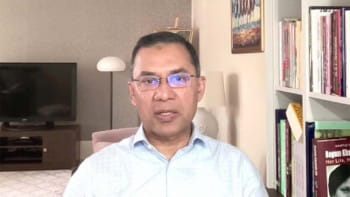Should Trump's win concern Bangladesh?

If there is one thing we have learnt from the US presidential elections this year, it's that polls, political commentary and predictions are of little significance. The crushing defeat of career politician Hillary Clinton at the hands of business magnate Donald Trump was foreseen by few. Despite running a campaign filled with hateful rhetoric, Trump successfully generated a populist wave, especially among white working class voters who seemed to have found an unlikely hero in the controversial figure. As a result, the post-election analyses have mainly stemmed from two questions: What contributed to Trump's win? And what is in store for the US and the world for the next four years?
For Bangladesh, though, are there reasons to be alarmed? Before jumping to conclusions, we need to first rein in exaggerated assumptions—and there have been many fuelled by the media—in order to make realistic assessments of the threat that Trump actually poses. With ample paranoia already in the air about the global implications of a Republican-controlled government, it is imperative that this climate of uncertainty and instability isn't exacerbated through speculation and spreading of false news. The latter, in particular, has proved to be a formidable threat insofar as (purportedly) influencing the outcome of the presidential election. Ersatz "news" organisations operating under monikers such as 70News and American News use Facebook and Google AdSense to spread misinformation and tech giants are facing mounting pressure as a result to block sites that peddle misleading stories. Then there are statements that Trump has made himself in the campaign trail - from calling Mexicans "rapists" to demanding a ban on all Muslims - that has amplified the hysteria surrounding him. Note that the statement calling for a ban on Muslims mysteriously disappeared from his campaign website after the elections, prompting many to believe that his xenophobic and nativist rhetoric was primarily designed to be a campaign device to harness votes.
Political pundits now wonder, what does Trump really believe? Does he even have a coherent foreign policy? It has become difficult to differentiate the mania from the legitimate threats that the rise of Trump represents, which is essential to predict the likely policies he will pursue and their ramifications.
In this regard, there are three areas of particular interest to Bangladesh: trade, immigration and climate change. The US is the largest export destination for Bangladesh outside of the European Union and a majority of Bangladesh's exports to the US comes from the RMG sector. However, Bangladesh lost duty-free access to the US market (benefits of Generalised System of Preferences) in 2013 as a result of the collapse of Rana Plaza and Tazreen factory fire, and business leaders in the country believe that there will be little impact on its trade with the US. Historically speaking, there have been no major changes in US trade policy towards Bangladesh in the last three decades. As far as Trump's vehement criticism of outsourcing is concerned, Bangladesh, once again, should not be too worried as most of his threatening trade rhetoric is directed at China and Mexico, two of the US' largest trading partners.
When it comes to immigration and climate change, however, there is cause for concern for Bangladesh. Immigration was a central issue of Trump's campaign; he has pledged to build a wall on the border with Mexico and deport millions of undocumented immigrants (many of whom are Bangladeshi), and expressed support for extreme vetting of Muslims entering the US. Trump's policy advisers are reportedly considering the reinstatement of a national registry of immigrants and visitors from Muslim-majority countries where militant groups are active. This does not bode well for Bangladesh since the Gulshan attack allegedly carried out by ISIS along with a string of targeted killings over the last few years has jeopardised the secular image of the country and forced the Bangladesh government to ramp up its efforts in thwarting militancy.
Last but not least, environmental policies under the Trump administration are perhaps the most critical issue facing Bangladesh. Trump, who does not accept the overwhelming scientific evidence that climate change is real, wants to dismantle the Paris Agreement which was signed by nearly 200 countries last December and of which Bangladesh is a signatory. World renowned public intellectual Noam Chomsky, in an interview, recently echoed the concerns of environmentalists about the detrimental effects of such environment-unfriendly policies and cited Bangladesh as an example saying, "In Bangladesh alone, tens of millions are expected to have to flee from low-lying plains in coming years because of sea level rise and more severe weather, creating a migrant crisis that will make today's pale in significance." To make matters worse, the environmental agenda is at a point of contention for Bangladesh, given public opposition to the construction of Rampal power plant and the ensuing debate on politics versus environment. If the Trump administration adopts catastrophic environmental policies and withdraws from international agreements (despite the US being the second largest greenhouse gas emitter), it will set a dangerous precedent discouraging other countries, including Bangladesh, from committing themselves to tackle the effects of climate change and, in Chomsky's words, "accelerating the race to disaster."
The writer is a freelance contributor.


 For all latest news, follow The Daily Star's Google News channel.
For all latest news, follow The Daily Star's Google News channel. 



Comments